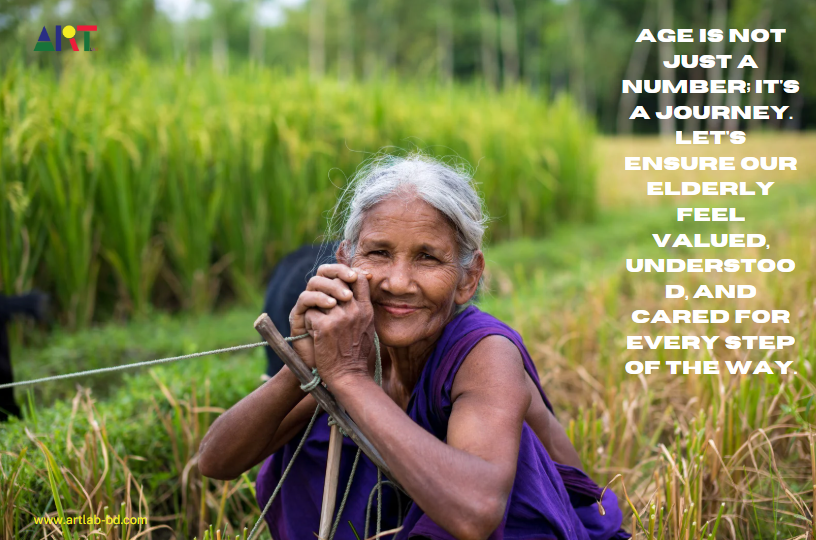
As a society, we often measure success, progress, and even human worth through tangible milestones—career achievements, educational degrees, financial accomplishments, and social statuses. However, one of the most overlooked yet significant stages of life is often the later years, when the wisdom and experiences of a lifetime have shaped individuals in ways that are both profound and transformative. Age, in its true essence, is not just a number—it is a journey, and it’s time we recognize and honor it as such.
In this blog post, we explore why it’s critical for us to ensure that our elderly are not just cared for, but are also valued, understood, and cherished as active members of society. From dispelling myths about aging to addressing the emotional and physical needs of our older generation, the importance of inclusivity, respect, and compassion cannot be overstated.
The Reality of Growing Older
For many, growing older can bring a sense of isolation. Society often places undue emphasis on youthfulness, productivity, and constant movement, leaving our elderly population to feel left behind or marginalized. While physical changes and age-related challenges are part of the natural process, they do not diminish the inherent worth and value of our seniors. Instead, aging brings with it a wealth of life experiences, knowledge, and perspectives that are irreplaceable.
Yet, too often, elderly individuals face loneliness, neglect, and a lack of understanding from those around them. Whether it’s physical or emotional barriers, many seniors find themselves in environments where their voices are not heard or their needs are not fully met. This can lead to feelings of isolation and even depression, a stark contrast to the rich lives they’ve led.
The Need for Empathy and Understanding
The first step toward addressing the needs of our elderly population is empathy. We must look beyond the physical appearance of age and acknowledge the incredible resilience and strength that come with it. Just like every other phase of life, older age requires patience, care, and respect.
It is essential that we, as a society, shift our focus from just offering medical or physical care to actively listening to the elderly, understanding their emotional needs, and respecting their autonomy. The elderly want to be recognized for their contributions, their achievements, and the wisdom they’ve gained over the years. They desire companionship, community engagement, and the opportunity to remain involved in activities that bring them joy and purpose.
Creating an Inclusive Environment for All Ages
Inclusivity extends beyond age, gender, and race—it encompasses the need to create environments where everyone, regardless of age, feels a sense of belonging. For the elderly, this can mean ensuring that public spaces are accessible, that social activities cater to their needs, and that they are not subjected to stereotypes or biases about aging.
One of the most important aspects of creating inclusive environments for the elderly is intergenerational interaction. Encouraging younger generations to spend time with older generations fosters mutual understanding, reduces prejudice, and creates deeper bonds across age groups. By giving younger people the chance to learn from the elderly, we can create stronger communities that value all stages of life.
Support and Advocacy for Elderly Rights
In addition to empathy and social inclusion, it is imperative that we advocate for policies that support the rights and well-being of our elderly. From healthcare access to financial security and social support systems, the elderly require dedicated resources to ensure their quality of life remains high. We must continuously push for improvements in services that address age-specific challenges, ensuring that these programs remain sustainable and accessible for all.
Equally important is the advocacy for elderly empowerment. Empowerment goes beyond offering physical or financial support; it also involves respecting their voice in decisions that affect their lives, whether it be in family matters, community issues, or national policy. Seniors should have a say in shaping their own futures, from healthcare decisions to the rights that impact their dignity and respect.
A Call to Action: Let’s Make a Difference
We all have a role to play in ensuring that our elderly are not just seen as the final chapter of life, but as an integral part of our community. Age is not just a number; it’s a journey—one that deserves our support, care, and respect. Whether through small gestures like a visit, a kind word, or simply offering our time, or by advocating for larger systemic changes that prioritize the elderly, we can all make a meaningful difference.
The truth is, we cannot wait for our elderly to become a burden to society before we act. The time to show appreciation, respect, and love for our seniors is now. It is essential for the well-being of our communities, for fostering intergenerational bonds, and for ensuring that every stage of life is treated with the dignity it deserves.
Let’s start today by ensuring that no elderly person feels alone, forgotten, or less valuable. Let’s celebrate every step of the way, acknowledging that their journey is as significant as any other.

